Brad Treliving continued his spree of adding huge defenders by picking up a college prospect, Boston University’s Cade Webber.
Webber, a fourth-year player for BU, was a former fourth-round pick in 2019 of the Hurricanes who is currently unsigned. The Maple Leafs have acquired his rights and the opportunity to sign him in exchange for a 2026 sixth-round pick.
It is not a trade deadline move relevant to the NHL club at this time, but Webber will add something to Toronto’s minor league depth should the Leafs sign him after Boston University’s season ends. What is that something? Let’s find out.
Who is Cade Webber?
Webber is a 23-year-old left-shot defenseman from Meadville, Pennsylvania who is known primarily for his ginormous size, listed at 6’6″, 194 lbs. on Elite Prospects but an even larger 6’7″, 216 lbs. on Boston University’s roster.
Webber played for the Pittsburgh Penguins Elite program before joining The Rivers School in Weston, Massachusetts, a high school prep team coached by former NHLer Shawn McEachern. He also played for the US U17 team at the Five Nations Tournament and the U18 team at the Hlinka Gretzky Cup, leading to his 99th overall draft selection in the 2019 NHL Entry Draft by Carolina.
After graduating high school, Webber did what most US high school prep players do by playing a season in the BCHL. The jump from high school hockey (a route not too many players choose) to the NCAA is a large one, so playing in an intermediate league like the BCHL or the USHL makes that transition a bit easier. Webber played for the Penticton Vees of the BCHL, scoring five points in 23 games, and then enrolled at Boston University in 2020.
Since joining BU, Webber has been a regular for the Terriers, an every-night player under coaches Albie O’Connell and Jay Pandolfo (also a former NHLer). Webber only played 14 games in 2020-21 during the COVID-shortened season. Since then he’s played 31, 40, and 30 (and counting) games, translating to a full season of work.
From a counting stats standpoint, Webber has produced very little offensively. He has one total goal in 115 games of college hockey and only 15 assists to go with it. There would appear to be very little offense in his profile, which has probably contributed to him playing the full four seasons in the NCAA.
This season for Boston University he has mostly played with fellow veteran Case McCarthy (the team captain). BU has been one of the NCAA’s best teams — currently 19-8-1, ranked #2 in the country, and on pace for a top seed in the NCAA Hockey Tournament. The success of the Terriers on the ice has been due, in part, to three balanced defensive pairs that each offer something different.
Their top pair has mega-star Lane Hutson, one of the NCAA’s most prolific points-getting defensemen (a Montreal Canadiens prospect) and a very small, shifty puck-mover. The other two pairs offer something stylistically different from each other. One pair features Vancouver Canucks first-rounder Tom Willander, a smooth-skating transitional defenseman who can tilt the ice across 200 feet (the team leader in +/-) alongside with either Aiden Celebrini (Macklin’s brother) or Ty Gallagher. The other is the pairing of Webber/McCarthy, who are two big, defense-first players.
Your author is not an expert on the usage of those other two pairs (I follow Big Ten Hockey closely, not Hockey East), as the sorts of analytics and time-on-ice data available for the NHL don’t exist for the NCAA. However, one can surmise through McCarthy and Webber’s point totals (12 combined points in a 30+ game season) that they likely receive more defensive-zone starts and handle the tougher, grittier minutes. Moreover, that jibes with what prospect people and BU reporters have written about Webber over the years.
A student-run Boston U hockey blog discussed Webber during the team’s run to the Frozen Four last March, writing the following:
“The Terriers play at breakneck speed, zipping past defenders in transition to create the odd-man rushes they feast on. Webber, BU’s bruising 6-foot-7 defenseman, would rather throw himself in front of a slapshot on the penalty kill than spring a 2-on-1 the other way. But in a tense, tight-checking playoff game, the snarl, consistency and discipline of Webber is key to BU’s success. Webber is on the ice to block shots, defend with physicality and make the correct read. He stars in that role. Against Merrimack on Saturday, he played the part to perfection.”
They go on to note that Webber was the team leader in blocked shots and a stabilizing force on a team with an iffy defense, contrasting their high-powered offense. In particular, they contrast Webber’s game with that of the offensive dynamo Hutson. It mostly lines up with what you’d expect to be true when you take a gander at Webber’s stats.
As for scouting from prospect watchers, a Carolina Hurricanes fan blog was not terribly optimistic about Webber’s chances of making the NHL back in September 2022. They praised Webber’s skating — which is considered decent for a player of his size — as well as his defensive fundamentals, reach, shot-blocking, and defensive IQ, but ultimately felt his limitations as an offensive player and lack of transitional ability would stop him from reaching the big leagues. Corey Pronman of The Athletic described Webber as possessing athletic tools as a solid skater for his size but noted that Webber’s ability to play the puck beyond basic passes was extremely limited.
However, there is still some optimism from current college hockey waters. Colby Cohen covers games out east for ESPN and tweeted the following:
I’ve watched Cade Webber play about 100 games at BU. He’s a 6’7” physical , shot blocking machine who skates well and can make a first pass. This is a well developed prospect and is 100% worth a 6th round pick by the #LeafsForever @DailyFaceoff | @frank_seravalli
— Colby Cohen (@ColbyCohen36) March 7, 2024
In totality, Webber appears to be a defense-first defenseman with a mammoth frame and not-bad mobility for a player that size. He seems to have good hockey sense in his own end and is a pillar of defensive stability for his high-skill, high-talent team. However, the offense has never really developed, and it’s fair to wonder whether he will have enough ability to play the puck to handle professional hockey’s forecheck pressure and what is required of modern defensemen.
If the Leafs are to sign him and everything goes well, perhaps Webber could be an Ilya Lyubushkin or Joel Edmundson type — or Simon Benoit with more size — as an all-defense, offensively-limited defenseman who can play on a bottom pair and get by okay in his own end. If it doesn’t all pan out, Webber is organizational depth in a mammoth frame. For a future (2026) sixth-round pick, the worst-case scenario is probably a wash as picks so late have an extremely low probability of producing anything valuable.









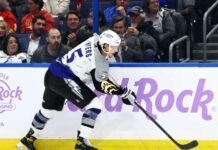


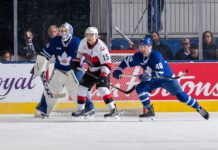





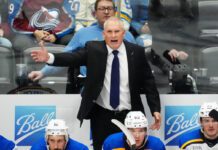


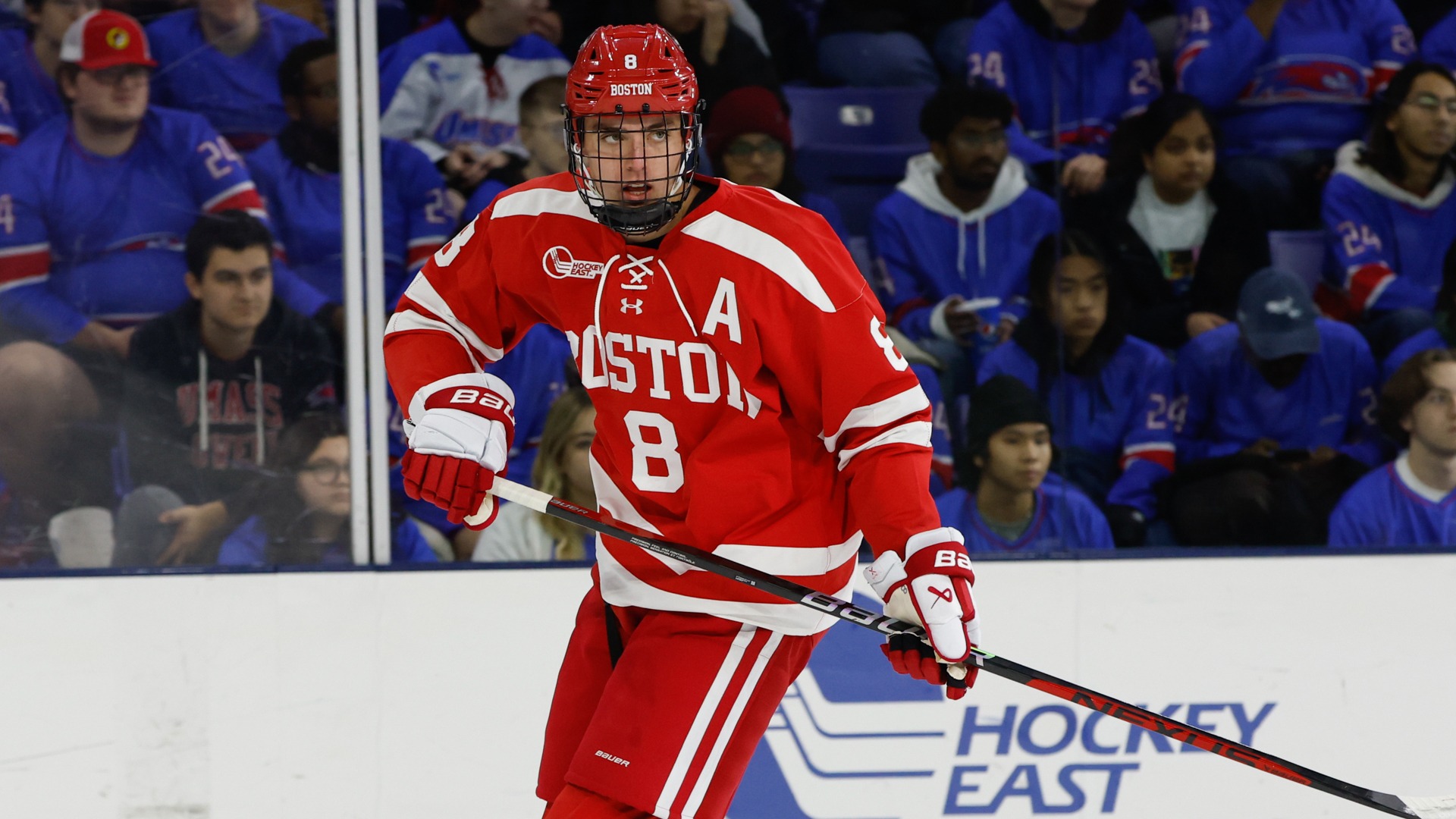
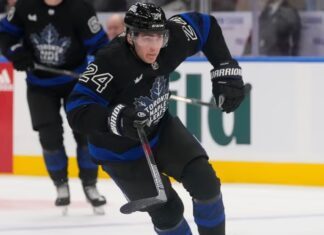







![New Leaf Anthony Stolarz on the opportunity in Toronto: “In Florida, I knew my role as a backup… Now, [Joseph Woll] and I are competing for starts… As a goalie, that’s all you can ask for” Anthony Stolarz, Stanley Cup win, now Maple Leaf](https://mapleleafshotstove.com/wp-content/uploads/2024/07/anthony-stolarz-sc-100x70.jpg)
